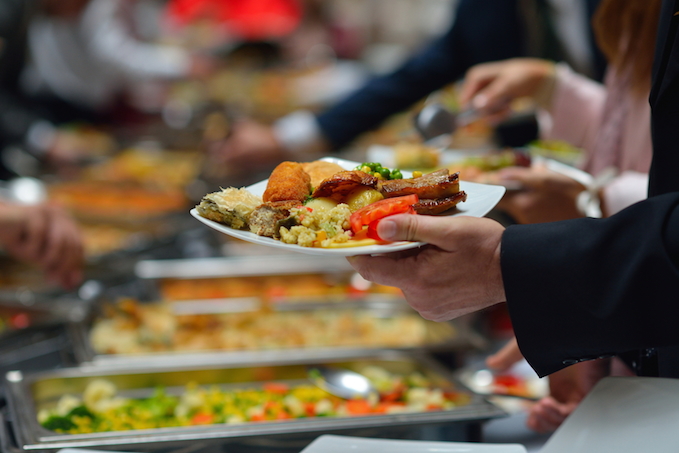3 Tricks To Not Let A Feast Ruin Your Diet

So you’ve been making progress with your diet…
The weight has been coming off consistently, week by week, and you’re generally pretty darn pleased with your progress.
You’ve accomplished this by taking control of what you eat. For the first time, you know exactly what you’re putting in your body, and it seems to be working.
However, you’ve got a problem…
Well, it shouldn’t actually be a problem – it should be fun – but it threatens to disrupt your diet nonetheless.
Basically, you’ve got a big dinner lined up for the evening with a group of your friends.
You know that realistically everyone else will be putting down thousands and thousands of calories, which doesn’t really mesh well with the diet you’ve been keeping.
But this dinner doesn’t have to ruin your diet…
In fact, if you plan accordingly, you really can pig out (occasionally) and not have it hurt your progress.
How To Handle A Gluttonous Event When Dieting
You can’t prepare for everything in life, but when you’ve got a dinner coming up like the one I described above, a little preparation goes a long way.
Basically, you can significantly mitigate any damage from chowing down 1000s of calories in a single meal if you follow these 3 simple ‘tricks’.
1) Fast before the meal
2) Get in your protein
3) Eat in the right order (optional)
Let me go over these 3 simple tricks in a little more detail, so that you can see exactly how to handle these events in the future with your diet unscathed.
1) Fast Before The Meal
There are lots of benefits to adopting an intermittent fasting approach to eating. In fact, it is how I eat pretty much every day, but that is the subject for another article.
Simply put, fasting can simply be defined as not having eaten for a period of time, so that your body enters a ‘fasted’ state instead of a ‘fed’ state.
If you are already eating like this, great – you don’t need to do anything differently, aside from perhaps extending your fasting window up until the actual event.
But if you’re like most people who aren’t currently on an intermittent fasting diet, then you’ll simply want to not eat any of your normal meals during the day.
So you’ll be skipping your regular breakfast, lunch, and any other snacks that you’d normally have.
By doing this, you’ll be effectively saving up these calories for your evening binge.
But I’ll be hungry, I hear you thinking.
Well, yes, you might be a little peckish, but the next point will help address that too.
2) Get In Your Protein
Generally when people let themselves eat with reckless abandon, they have no trouble consuming copious amounts of fats and carbs. Unfortunately, protein often gets neglected in favor of gorging yourself on these more fun macronutrients.
So the solution to this, especially if you are currently weight training and trying to keep your protein intake high, is to get all of your protein out of the way early in the day.
This way, when it comes to the feast, you won’t even have to worry about eating any protein (unless you want to). It’ll all be taken care of already, making the experience that much more carefree and enjoyable.
There is another benefit to this too…
Protein is very satiating. This means that even if you’re not used to fasting, consuming protein will keep you full longer, making it considerably easier to hold out until the meal.
So, let’s say that the dinner is at 7:30pm. You would eat one protein-only meal at say 12pm, and another small one at 3-4pm.
Yes, this isn’t technically fasting, but if you do this correctly you’ll have only taken in less than 500 highly satiating calories by the time your dinner arrives.
Good protein sources for this are turkey, chicken, cottage cheese, and egg whites – all of which are pretty much exclusively protein, with very few carbs/fats.
If you still find that you’re too hungry, however, add in a few fibrous vegetables as well. That, in combination with the protein, should be able to keep your hunger at bay until dinner.
3) Eat In The Right Order
Now this one is optional.
If you just feel like pigging out from the get go, then go right ahead. If you’ve followed the 2 points we’ve already discussed, then you’ve already given yourself a pretty big cushion.
However, if you want to automatically limit the potential for overeating even further, then try this additional little trick.
Basically, for most people, the easiest thing to eat quickly when you’re really hungry are carbs.
I know that I can stuff my face with 1000 calories of carbs without blinking an eye when I haven’t eaten in awhile.
Well, you can avoid taking in too many carbs too quickly by starting your meal with something that is high fat. Steak and other red meats are perfect for this.
If you do this, you’ll start to fill up on foods that you are less likely to over-consume – so that by the time you get to the carbs, you’ll likely end up taking in fewer calories without even thinking about it.
Have Your Cake And Eat It
So next time you’re at a dinner where you’re likely to overeat, don’t worry about it. It doesn’t have to ruin your diet.
Yes, if you adopt the strategies mentioned above, you can have meals like this where you go all out, while still dropping weight on the scale that week.
If you learn to become more flexible with your diet, you’ll be amazed by how much this can limit the stress and anxiety of ‘breaking’ it.
At the end of the day, you really can (sometimes) have your cake and eat it while dieting. In fact, many people are actually more successful when they do.